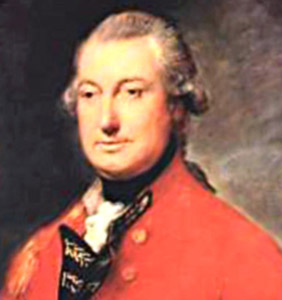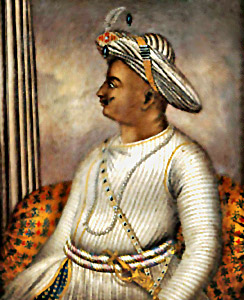 Lord Cornwallis was appointed as the Governor-General of India in the year 1786 and he also became commander in chief for Bengal under the Pitt`s India Act. An aristocrat by birth, Lord Cornwallis was delegated with the work of reorganising the administrative system of India. The British administration in India was facing land revenue problems, judicial corruption and the commercial departments lay disorganised. Lord Cornwallis was entrusted with task of analysing these hindrances and figure out a probable solution. He also led the British forces in the 3rd Anglo-Mysore War and defeated the great Tipu Sultan, ruler of Mysore. In the year 1786, Lord Cornwallis became a Knight Companion of The Most Noble Order of the Garter.
Lord Cornwallis was appointed as the Governor-General of India in the year 1786 and he also became commander in chief for Bengal under the Pitt`s India Act. An aristocrat by birth, Lord Cornwallis was delegated with the work of reorganising the administrative system of India. The British administration in India was facing land revenue problems, judicial corruption and the commercial departments lay disorganised. Lord Cornwallis was entrusted with task of analysing these hindrances and figure out a probable solution. He also led the British forces in the 3rd Anglo-Mysore War and defeated the great Tipu Sultan, ruler of Mysore. In the year 1786, Lord Cornwallis became a Knight Companion of The Most Noble Order of the Garter.
Early Life of Lord Cornwallis
Lord Cornwallis was born on December 31st, in the year 1738, to the parents Elizabeth Townshend and Charles Cornwallis, 5th Baron Cornwallis, who later became 1st Earl Cornwallis. He was born in Grosvenor Square, London, England, although his family house was in Kent. Cornwallis studied in Eton College and Clare College, Cambridge. Lord Cornwallis later became the 2nd Earl Cornwallis in the year 1762, succeeding his father.in the year 1757, he joined the British Army and in 1766 he promoted to the position of Colonel. He also led the British army in the American War of Independence in 1776. Lord Cornwallis was married to the regimental colonel`s daughter, Jemima Tullekin Jones in 1768.
Judicial Reforms of Lord Cornwallis
 In order to straighten the judicial problems Lord Cornwallis introduced the judicial reforms in India. These included the concentration of power in the able hands of the Collector. The new Governor-General was answerable only to the Board of Control that appointed him. Hence, he was able to resist the petty interest of the East India Company when they came in conflict with the state policies. During his office (1786-1793), Lord Cornwallis suspended the Board of Revenue and enforced new regulations for trading. He was the first person to put everything under the Company`s rule. Hence the entire administration was reorganised.
In order to straighten the judicial problems Lord Cornwallis introduced the judicial reforms in India. These included the concentration of power in the able hands of the Collector. The new Governor-General was answerable only to the Board of Control that appointed him. Hence, he was able to resist the petty interest of the East India Company when they came in conflict with the state policies. During his office (1786-1793), Lord Cornwallis suspended the Board of Revenue and enforced new regulations for trading. He was the first person to put everything under the Company`s rule. Hence the entire administration was reorganised.
As far as his judicial reforms were concerned, Cornwallis came forward with the Cornwallis Code of 1793. After taking care of the judicial administration he concentrated upon the revenue reforms. In this context one cannot possibly miss out the Permanent Settlement of Bengal in 1793. He introduced ten year contracts to the Zamindars in Bengal. Besides these Lord Cornwallis was also responsible for the making the high posts in the Government administration available only to the British officials. In fact all the Indian officials were dismissed and these posts were reserved only for the Europeans.
There was rampant corruption in the Commercial Department. To fight this evil, Cornwallis reduced the strength of the Board of Trade and eventually Commercial Residents were set up to procure supplies. Tribulations like bribery, corruption and the problems of private trade were suppressed. Apart from taking care of the administration Lord Cornwallis was also on military enterprise. He had to face huge resistance from Tipu Sultan, ruler of Mysore during 1782 to 1799. Lord Cornwallis led the British army to the Third Mysore War in the year 1790-1792. The war ended with Tipu Sultan`s surrender of half of his kingdom to the British.
Lord Cornwallis succeeded Warren Hastings in India. Although, not as brilliant as him, Cornwallis was successful in evoking devotion to duty, perseverance and modesty. Cornwallis was lucky to have able assistants like John shore, James Grant, George Barlow and others. As far as his administrative reforms were concerned, his achievements were so impressive that these were often termed as perfect. Lord Cornwallis tried to solve the problem is India by through his various reforms and measures. He was responsible for introducing British principles and planting British institutions in India.
In 1793 Lord Cornwallis returned to England to receive the title of the marques and was granted a seat in the Privy Council. He was later also given a place in the Cabinet. Lord Cornwallis died on October 5th, 1805.






































